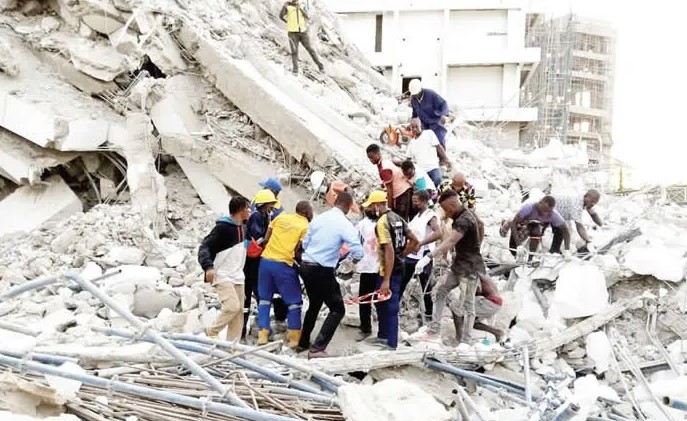Building collapse in Nigeria has been on the increase in recent times.
There are several incidents and reports of collapsed buildings in major cities like Lagos, Abuja, and Port Harcourt among others.
Research findings indicate that most building collapse cases are mostly man-made due to faulty design, faulty construction, and use of substandard building materials, negligence, omissions, ignorance, quackery, corruption and sabotage.
There are cases of building coming down across the country on monthly basis over the last 10 years and this incidences has continued.
Just last week, at Oba Idowu Oniru Street in Victoria Island on Sunday, September 4 a seven-storey building under construction caved in, killing two persons in the process.
This development led to the resignation of the Commissioner for Physical Planning and Urban Development, Idris Salako.
Reports indicate that three cases were recorded in 2020, six in 2021, while nine cases occurred in 2022 just in Lagos alone.
Cases of Building Collapse
The highest tragedy so far was on November 1, 2021 when a 21-storey building collapsed on Gerrard Road, Ikoyi, killing 46 persons, including the developer of the building, Femi Osibona.
According to the report, the owner of the building under construction in Ikoyi, was given approval to construct only 15 floors, but raised the structure to 21 floors.
However, barely 24 hours after the collapse of the 21-storey building, a two-storey edifice under construction at Osapa London area of Lekki partially caved in following a heavy rainfall.
Although committees were set up to probe the Ikoyi incident separately by the Lagos State Government, Nigerian Building and Road Research Institute and the Council of the Regulation of Engineering in Nigeria, nothing much had changed to stop the trend of building collapse in the state.
Seventeen days after the Ikoyi catastrophe, precisely on November 17, 2021, another two-storey building under construction around Magbon in the Badagry area of the state collapsed, killing four construction workers.
Emergency responders, Lagos State Emergency Management Agency (LASEMA) including members of the community, however, rescued five other survivors, who sustained varying degrees of injury and were rushed to hospital.
Similarly, a three-storey building under construction at Akanbi Crescent, in the Yaba area of Lagos, collapsed on February 12, 2022, killing five people in the process.
Disaster struck again on May 1, 2022, Workers Day, on Ibadan Street, Ebute-Metta area, when 10 tenants lost their lives after a three-storey building collapse.
In Abuja, the Federal Capital Territory, the case is not different, last month Two persons were confirmed dead after a shopping mall collapsed in Kubwa, a satellite town.
The way out
Some experts urged the Federal Government to enact the National Building Code, put in place a Construction Industry Commission, training and retraining of building practitioners and strict adherence to quality building materials according to specifications.
A former Dean of the Faculty of Engineering, University of Lagos, Prof MA Salau posited that the general public has a major role in preventing the incidence of building collapse.
He urged government regulatory bodies to ensure enforcement of building code throughout the construction industry in Nigeria.
A former Director General of the Standard Organisation of Nigeria, Dr John Akanya noted that only acceptable high quality building materials either locally produced or imported should be allowed into the market.
Proper planning, supervision and monitoring of construction activities should be institutionalized by policy makers to ensure that all buildings are constructed according to design, specifications and planning regulations.
Professionals ethics
Professionals in the building industry should maintain their integrity, professionals ethics and work in accordance to standard practice procedures laid down by the standard form of building contracts especially when they play in the hands of ignorant clients.
Urban or Town development agencies at various levels of government (commission, Board, Authority) should enforce control of building works in their localities as laid down in urban and regional planning decree 88, of 1992 and as in section 13 of National Building Code 2006.
There is need to organize periodic public awareness campaign through electronic and print media to sensitize the public on advantages of using professionals for buildings construction.
Standard organization of Nigeria (SON) should be vigilant to ensure that building materials§ imported into the country conforms to standard requirements.
All building professionals must play key roles in building standard houses, using the right professionals at any stage of the building process.
It is the duty of the architect as the prime consultant to direct the client to use the right professionals.
Structural services and drawings brought to the appropriate government offices are stamped and signed before proceeding to planning authority for “building permit”.
Soil investigation, material tests and environmental impact assessment (E.I.A) should be made compulsory for all institutional, industrial and commercial buildings.
Source: radionigeria




